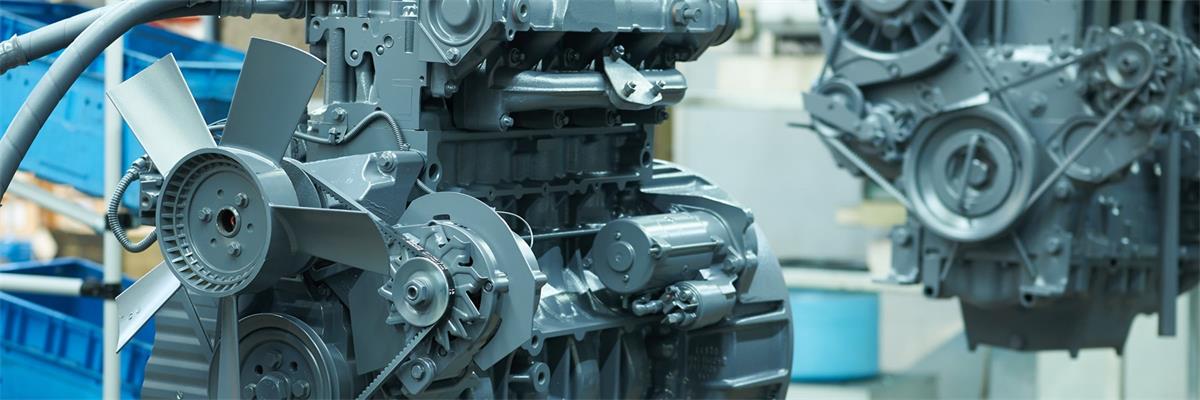
Fault Analysis on Diesel Engine Failure to Start(4)
1. High oil consumption
Fault phenomenon: During the working process of the diesel engine, it is found that the oil consumption at a certain stage is increased than usual.
Failure analysis:
Factors leading to high oil consumption in diesel engines include:
1) High oil level;
2) Low oil grade and incorrect viscosity;
3) Oil leakage;
4) Equipment tilted for a long time.
Troubleshooting methods:
1) Adjust the amount of engine oil to the oil level;
2) Replace the engine oil according to the standard;
3) Repair each joint surface, oil pipe, and oil seal (replace if necessary);
4) Reduce the tilting working time.
2. Cooling water temperature is too high
Fault phenomenon: The water temperature is too high during the operation of the diesel engine. When the diesel engine is working at full load for a long time, the water temperature is too high and an alarm occurs.
Failure analysis:
Factors causing high water temperature in diesel engines include:
1. Lack of coolant in the water tank;
2. Loose or broken fan belt;
3. Damage to the fan;
4. Damage to the water pump and no coolant circulation;
5. Failure of the thermostat;
6. The external heat sink of the water tank is clogged;
7. The inside of the water tank is clogged or calcified.
Troubleshooting methods:
1. Add enough coolant and check for leakage points;
2. Tighten or replace the belt;
3. Replace the fan;
4. Check the water pump and replace if necessary;
5. Replace the thermostat;
6. Clean the heat sink dust in the room;
7. Replace the water tank.
Maintenance suggestions: Check the coolant level in the water tank frequently to prevent leakage in the cooling system. At the same time, the quality of the coolant must be ensured to reduce the possibility of scaling in the water tank. It is prohibited to use untreated heavy water such as river and lake water instead of coolant. In special cases, soft water such as distilled water can be used instead of coolant.
3. Diesel engine slows down seriously
Fault phenomenon: The diesel engine starts normally and works normally at high and low idle speeds. When the equipment is heavily loaded, the speed drops seriously, the rotation speed drops to about 1100~1300rpm, and the vehicle speed is also low, but it returns to normal after working for a short period of time.
Troubleshooting process: Check the fuel system pressure and flow, and find that the pressure and flow are both low. Check the fuel system pipelines and filters, and find that there is foreign matter stuck in the hand oil pump. After clearing it, it returns to normal.
Analysis of the reasons: The diesel engine starts normally, and the high and low idle speeds work normally, indicating that there is no fault in the electrical part of the diesel engine, and the fault point should be in the fuel system. The blockage of fuel system pipelines and filters affects the normal fuel supply of the diesel engine, causing the pressure in the low-pressure oil circuit to build up slowly, resulting in less fuel supply to the cylinder, low fuel supply pressure, poor atomization, and low diesel engine power. After solving the problem of fuel system pipeline and filter blockage, it can usually return to normal. In addition, a faulty fuel pump can cause the same phenomenon. You can judge whether the oil transfer pump is working normally by checking the diesel oil line pressure (>5bar) and flow rate (>8L).
Suggestion: When the diesel engine is started after a long interval, it takes a certain amount of time to build up pressure in the low-pressure oil circuit. If it immediately enters heavy-load operation, the output power will be low. It is recommended that the equipment starts working in the medium-speed zone with no load for about 20 seconds after startup.
4. Diesel engine injector failure analysis
Fault phenomenon: When the diesel engine is started and runs at low speed, white smoke is emitted; when the load is increased, black smoke is emitted from the exhaust pipe, the engine power is obviously insufficient, and the speed drops.
Failure analysis: The above phenomena are mostly due to poor fuel atomization in the injector. The main reason is the use of unclean fuel. When the diesel filter element is damaged and cannot completely filter the fuel, the fuel nozzle assembly is stuck, or the opening pressure of the fuel injector is too low.
Troubleshooting method: Loosen the high-pressure oil pipe joints of each cylinder in turn (cylinder disconnection method). When you feel that there is no obvious change in the sound of the diesel engine after a certain cylinder is disconnected, or the speed does not change much, you can conclude that the injector of this cylinder is faulty. If there is a fault, then remove the injector of this cylinder and put it on the inspection bench for a pressure test to know the cause of the fault. If the injector coupling is stuck, replace it with a new coupling and adjust the pressure, and it will return to normal. If the diesel engine speed of each cylinder is not much different after the cylinder is stopped, you should also check whether the diesel filter element is damaged.






